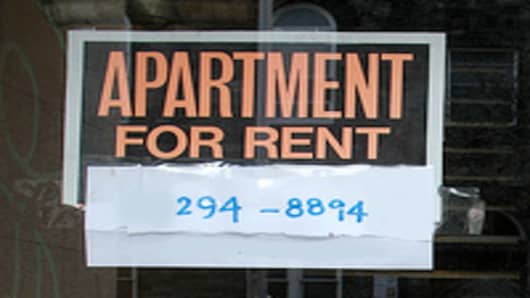Despite record low mortgage rates reported todayand rising affordability in most U.S. housing markets, rent is the new reality for former home owners and new households alike.
For some it is post-traumatic stress from the housing crash, for others it is the inability to get financing to buy a home. Either way, the rental market continues on its tear.
In the last quarter of 2011, the apartment sector saw its largest quarterly increase in occupied stock of the year, according to Reis, Inc.
The vacancy rate dropped to 5.2 percent, the lowest since 2001 and lower than the last cyclical drop in 2006.
This bucks the historical seasonal weakness typical of the colder months of the year. The fourth quarter also tends to be a weaker leasing period, according to Reis, given that most households make moving decisions in the second and third quarters.
This surge in occupancy pushed asking and effective rents up 0.4 and 0.5 percent respectively, which Reis calls the only disappointing figures for the sector, missing expectations. Reis blames that on slow economic growth and still high unemployment.
“Higher quality properties in the most desirable locations posted rent gains in excess of 5-10 percent, while class B/C properties, catering to lower income tenants, found it relatively more difficult to raise rents,” notes Victor Calanog, head of research at Reis.
Nowhere is that more evident than in the Washington, DC metro area where rents are way up across the city, and developers are rushing to erect new multi-family buildings and rehab old ones.
“Everybody wants to be in DC,” beams Richard Key, district manager for Camden Property Trust, one of the largest publicly traded multifamily REITs in the nation. “Whereas in other markets there are deals, when you get to DC area, all the REITs want to be here, and so we're all competing for the same piece of land, and that's driving the price up. That is really is a challenge for us.”
Key is convinced that there has been a fundamental shift in attitudes toward home ownership that will last for several more years. He is not concerned that the pendulum will swing back to buying, just as all that new rental stock hits the market around 2014. Camden has seen rents on its DC properties rise over 5 percent in just the past year.
“The nice part is we haven’t seen a drop in occupancies with that rent growth, and so the hope is that we’re able to maintain our historical occupancies and continue to see that five, six, gosh, seven percent is not out of the question in the next couple of years,” says Key.
Washington, DC will likely see those higher rents because home prices didn’t fall very high during the housing crash and are already rebounding. It and Detroit were the only major markets posting annual gains on the latest S&P/Case-Shiller Home Price Index.
Other markets, like Las Vegas, where home prices are rock-bottom thanks to a huge supply of foreclosures, the rental market is tougher for developers and landlords.
As for renter society, it is also being fueled by tight mortgage underwriting. Rates may be at record lows, but only if you can get them. In a paper released Wednesday, Federal Reserve Chairman Ben Bernanke noted, “Continued efforts are needed to find an appropriate balance between prudent lending and appropriate consumer protection, on the one hand, and not unduly restricting mortgage credit, on the other hand.”
Until that balance is found, potential home buyers will stay on the sidelines, those sidelines being rental apartments. A new twist to watch, however, may be that rental nation will go single family.
With so many bank owned homes left to clear, and so many in government and the private sector looking at bulk rental investments, apartments may have big competition in the same neighborhoods where they used to compete against single family buyers.
Questions? Comments? RealtyCheck@cnbc.comAnd follow me on Twitter @Diana_Olick



